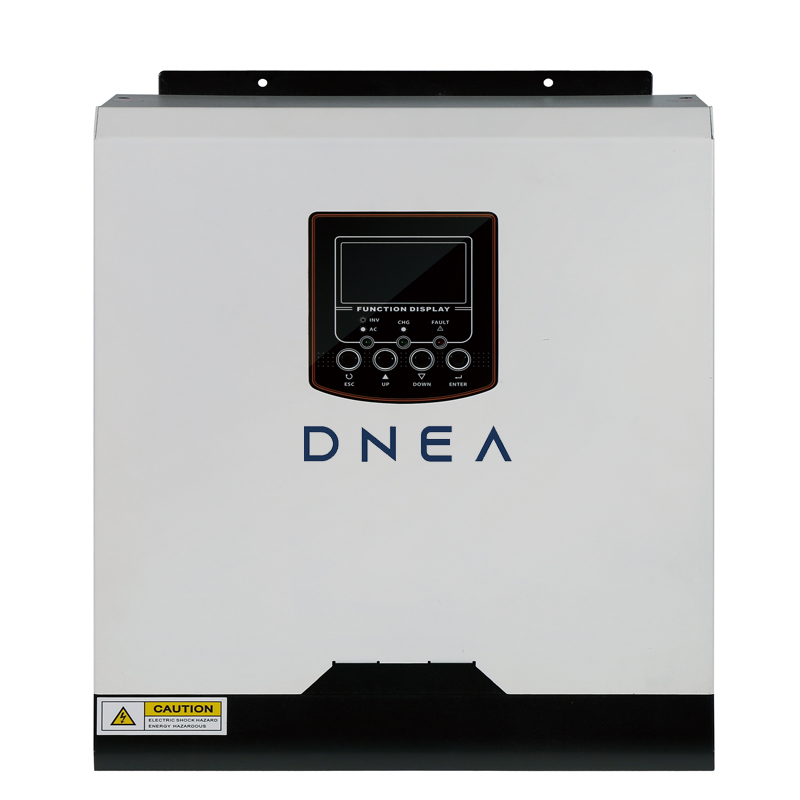DNEA Digital New Energy Africa | Innovative Solutions for Sustainable Power & Wind Turbines
- 010 824 1395
- 084 817 8179
- info@dnea.co.za
- Warranty Disclaimer and Claim Policy
Hybrid Inverter HY MPPT Series
R4900,00
DNEA’s Cutting-Edge Inverter Technologies: A Comprehensive Exploration of Grid-Tied, Hybrid, On-Grid, and Off-Grid Solutions for the South African Market
Description
- 1. Pure sine wave inverter
- 2. Built-in MPPT solar charge controller;
- 3. Selectable input voltage range for home appliances and personal computers
- 4. Selectable charging current based on applications
- 5. Configurable AC/Solar input priority via LCD setting
- 6. Compatible to mains voltage or generator power
- 7. Auto restart while AC is recovering
- 8. Overload and short circuit protection
- 9. Smart battery charger design for optimized battery performance
- 10. Cold start function
- 11. Parallel operation with up to 9 units only available for 5KVA ( HYB5032M / HYB5032MN )
DNEA’s Cutting-Edge Inverter Technologies: A Comprehensive Exploration of Grid-Tied, Hybrid, On-Grid, and Off-Grid Solutions for the South African Market
Introduction
As the demand for reliable and efficient energy solutions continues to rise, DNEA stands at the forefront of technological innovation, offering a diverse range of inverters tailored to meet the unique needs of the South African market. This essay will provide a comprehensive overview of the latest inverter technologies supplied by DNEA, covering grid-tied, hybrid, on-grid, and off-grid solutions. We will delve into the differences between Maximum Power Point Tracking (MPPT) and Pulse Width Modulation (PWM) solar controllers integrated into inverters, and highlight the benefits of grid feedback in the context of the South African market. Additionally, we will explore how DNEA ensures that its inverters meet local standards, possess cutting-edge technology, and provide unmatched reliability. Lastly, we will touch upon DNEA’s role as the sole importer and distributor of TESLA PV Inverters, further solidifying its position as a leader in the South African energy sector.
DNEA’s Commitment to the South African Market
Before delving into the specifics of the latest inverter technologies offered by DNEA, it is crucial to understand the company’s commitment to the South African market. DNEA recognizes the unique energy landscape of the region, marked by challenges such as load shedding and the need for resilient energy solutions. With a focus on providing high-quality and reliable inverters, DNEA ensures that its products not only meet but exceed the expectations of consumers in South Africa.
- Meeting Local Standards: DNEA takes compliance seriously and ensures that all its inverters adhere to the necessary South African standards and regulations. This commitment guarantees the safety, reliability, and legality of DNEA’s inverters, instilling confidence in customers and making them a trusted choice for local energy solutions.
- Cutting-Edge Technology: DNEA prioritizes staying at the forefront of technological advancements. By continually incorporating the latest innovations into its inverter solutions, the company offers South African consumers access to cutting-edge technology that enhances energy efficiency, system performance, and overall reliability.
- Unmatched Reliability: In the energy sector, reliability is paramount. DNEA’s inverters are engineered with durability in mind, ensuring that they can withstand the unique challenges posed by the South African climate. This commitment to reliability positions DNEA as a trusted partner for consumers seeking resilient energy solutions.
Overview of DNEA’s Inverter Technologies
DNEA offers a diverse range of inverters, catering to various energy needs and applications. From grid-tied to hybrid, on-grid, and off-grid solutions, DNEA’s inverter technologies are designed to provide efficient and reliable power generation for homes, businesses, and communities.
- Grid-Tied Inverters:
- Functionality: Grid-tied inverters are designed to operate in conjunction with the electricity grid. They convert DC power from solar panels into AC power and feed excess electricity back into the grid, often earning credits through net metering agreements.
- Application: Grid-tied inverters are suitable for locations with a stable and reliable electricity grid. They are an excellent choice for residential and commercial setups, allowing users to offset their energy bills and contribute excess power to the grid.
- Hybrid Inverters:
- Functionality: Hybrid inverters combine the functionalities of grid-tied and off-grid inverters. They can operate in grid-tied mode, drawing power from the grid, or switch to off-grid mode during power outages, relying on battery storage.
- Application: Hybrid inverters are ideal for locations where grid reliability varies or during load shedding events. They provide the flexibility to use solar power, grid power, or stored battery power, ensuring a continuous and reliable energy supply.
- On-Grid Inverters:
- Functionality: On-grid inverters, also known as grid-connected inverters, are designed to synchronize with the electricity grid. They convert DC power generated by solar panels into AC power, which can be used to meet the immediate energy demands of the premises.
- Application: On-grid inverters are suitable for areas with a reliable grid connection. They are commonly used in residential and commercial setups where solar power is intended to supplement grid power, reducing electricity bills and contributing to environmental sustainability.
- Off-Grid Inverters:
- Functionality: Off-grid inverters are designed for locations where no grid connection is available. They operate independently, converting DC power generated by solar panels or other renewable sources into usable AC power and storing excess energy in batteries for use during periods without sunlight.
- Application: Off-grid inverters are crucial for remote areas or locations with unreliable grid connections. They are commonly used in cabins, rural homes, and off-grid installations, providing a self-sustaining power solution.
DNEA’s Inverters: MPPT vs. PWM Solar Controllers
DNEA’s inverters come equipped with advanced solar controllers, which play a crucial role in optimizing the performance of solar power systems. Two common types of solar controllers integrated into DNEA’s inverters are Maximum Power Point Tracking (MPPT) and Pulse Width Modulation (PWM). Understanding the differences between these controllers is essential for selecting the most suitable solution for a given application.
- MPPT Solar Controllers:
- Efficiency: MPPT controllers maximize energy harvest by constantly adjusting the operating point of the solar panels to the point where maximum power can be extracted. This ensures that the solar panels operate at their highest efficiency, even in varying weather conditions.
- Flexibility: MPPT controllers are known for their adaptability to changing environmental factors, making them suitable for installations with dynamic sunlight conditions. They are particularly effective in scenarios where shading or partial panel obstructions are present.
- PWM Solar Controllers:
- Operation: PWM controllers maintain a constant voltage in the solar panels, allowing them to operate at their maximum power point. However, they do not actively adjust the operating point like MPPT controllers.
- Suitability: PWM controllers are generally suited for simpler solar installations where shading and dynamic conditions are minimal. While cost-effective, they may not maximize energy harvest in scenarios with fluctuating sunlight conditions.
Benefits of Grid Feedback for the South African Market
Grid feedback, facilitated by grid-tied inverters, holds significant advantages for the South African market. This feature allows solar power systems to contribute excess energy back to the grid, making solar installations more economically viable and environmentally sustainable.
- Cost Savings: Grid feedback enables users to earn credits or compensation for the excess energy generated by their solar panels and fed back into the grid. This feature helps offset electricity bills, making solar power systems more financially attractive for South African consumers.
- Environmental Impact: By contributing excess energy to the grid, solar installations with grid-tied inverters actively contribute to reducing the overall demand for conventional grid power. This not only lowers electricity bills but also promotes a greener and more sustainable energy ecosystem in South Africa.
- Grid Stability: Grid-tied inverters play a role in stabilizing the electricity grid by injecting clean and renewable energy. This can be particularly beneficial in regions where grid stability is a concern, as solar installations contribute to a more reliable and resilient energy infrastructure.
DNEA’s Leadership in Inverter Technologies
DNEA’s leadership in the South African market is underscored by its commitment to providing cutting-edge inverter technologies that prioritize efficiency,
RELATED PRODUCTS
Related products
-
Sale!
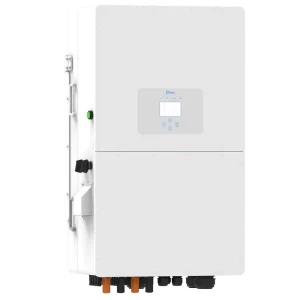
DEYE Hybrid SUN-50K 3 Phase 50KW Inverter High Voltage Hybrid Inverter with Energy Storage
R109900,00Original price was: R109900,00.R99900,00Current price is: R99900,00. Request Quote -
Sale!

DEYE Hybrid SUN-30K 3 Phase 30KW Inverter High Voltage Hybrid Inverter with Energy Storage
R69900,00Original price was: R69900,00.R68900,00Current price is: R68900,00. Request Quote -
Sale!
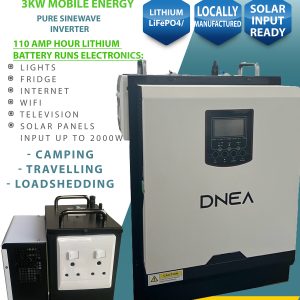
DNEA 3KW MOBILE ENERGY 2024 Model
R24900,00Original price was: R24900,00.R19900,00Current price is: R19900,00. Request Quote -
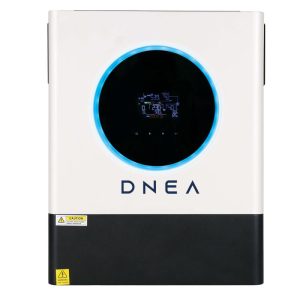
8KW 48v Off Grid Hybrid Inverter MPPT 150A Pure Sine Wave Type
R18900,00 Request Quote -
Sale!
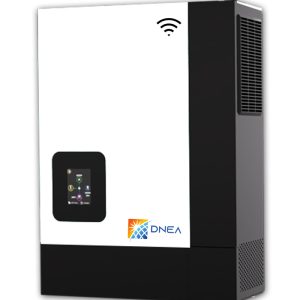
DNEA 6KW full Colour Touch Screen, Full Hybrid Inverter with MPPT solar controller Wi-Fi built in dual AC output, generator ready parallel up to 6
R21900,00Original price was: R21900,00.R19900,00Current price is: R19900,00. Request Quote -
Sale!
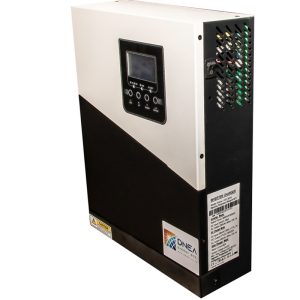
Inverter PRO Hybrid Solar 24V 3000W
R6900,00Original price was: R6900,00.R4900,00Current price is: R4900,00. Request Quote

